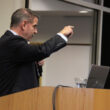It’s probably no surprise that, after recent events, I’m one of many who are questioning where we are as a nation and as individual citizens, and why.
Also, perhaps not surprisingly, readers and others have been emailing me with thoughts concerning the death of Charlie Kirk and the rise of political violence in America. I’ve heard from both sides of the aisle on this.
The act of cold-blooded murder that took place before our eyes was evil enough – wicked and shocking. What’s even more concerning is how some who disagreed with this thinking man, who is now dead at the hands of a coward, could purport to justify the act.
I’d like to think it goes without saying that when not just the perpetrator, but others who apparently share his views, believe that the death of an opponent is the best way to solve a disagreement, that begs some hard questions.
It’s not comfortable to ask this, but is what we’re witnessing evidence of who we are, where we are, and that we need to make some significant course corrections?
I’ve heard from people, who I know are not particularly religious, that this is a spiritual problem and I think they are right. There’s something wrong inside us. Unfortunately, it’s not recent, either.
I recently read a commentary written by a historian who pointed out that political violence has had a presence in America since our beginning, from the tarring and feathering – and executions without trial – of suspected loyalists to the king during Revolutionary times to the very recent killings of a Minnesota state legislator and her husband, attempts on now-President Trump’s life, the firebombing of the Pennsylvania governor’s mansion, and now this murder.
Yes, we’ve had a checkered past. The “good old days” were not always so good. There was sin then and there’s sin now.
But are we the same people we’ve been?
Do we hold to the moral, political and legal principles, which are now disparaged (at least in deed) by many of our intelligentsia when they don’t conveniently support their agendas? Do we acknowledge and value the “self-evident truths” set forth in the Declaration of Independence and in our constitutional documents, including the Bill of Rights?
The founders of our nation had a deep recognition and appreciation for the value, the worth, of each individual citizen who, they believed, is endowed with equal natural rights to life, liberty and the pursuit of happiness.
Do we still truly believe that each individual has inherent rights and value?
America is not perfect, and it never has been, even though many like to think we’re the greatest nation on earth.
But in a lot of ways we’ve descended into what I recently heard a prominent local citizen describe as a “cesspool” of self-gratifying, pride-inflating social media, which tells us things we want to hear about ourselves and allows us to shut out what we don’t want to hear.
We’re all about ourselves now. And because we’ve made ourselves (speaking generally here) into our own little gods who can control (particularly thanks to AI and social media) who we appear to be and are equipped to empower ourselves with declarations of how spectacular we are, I think we’ve become less tolerant of anyone who doesn’t acknowledge who we think we are.
Thus, we see unrest, hostility, apparent inability to graciously accommodate opposing viewpoints, and outright physical violence.
Those are the kinds of issues that Charlie Kirk addressed, head-on, in person. But instead of facing him in honest conversation, his killer shot him from a distant rooftop.
I didn’t follow Charlie Kirk. But I found his approach refreshingly honest, even if I may not have agreed with all of his ideas.
I respected Kirk for sitting face to face with those who didn’t agree with his views and discussing the issues. Students were encouraged to ask him questions and talk with him. He was considered approachable in a way that most politicians would not be.
He offered alternative views and solutions to those propounded by intelligentsia who dominate campuses and other seats of power today, and thus, he was labeled as divisive, racist, xenophobic and extreme, accused of hate speech. They hate his ideas, so they hated him.
Well, what do we call the bile coming from social media, individuals literally calling for the slaying of the rest of Kirk’s family?
It demonstrates the depth to which we have plunged. There have always been big issues in America that have divided citizens – allegiance to King George, slavery, women’s rights, social upheaval and Vietnam, abortion, new thinking about gender, just to name a few.
America has seen violence associated with some of these issues in the past, but the vile utterances on social media that we’re talking about threaten every liberty we know, whether we value them or not.
Do you think we will continue to have freedom of expression if people continue to abuse it in this way – or worse, seemingly without restraint? The very nature of civilization implies some level of cooperation, a foundation for self- and societal responsibility and cooperation. The antithesis, of course, is anarchy.
I could spend pages trying to give my opinion of what I think is going on, but I don’t have the ability to do that here. I recently watched a brand new documentary entitled “Truth Rising,” which can be found on YouTube.
It offers some very clear explanations for why things are the way they are and there are some very convincing explanations of what is going on, what has led to a bullet striking a young man who was simply trying to argue a point of view that, it appears, differed from that of the shooter.
Yes, there is a bit of Christian “bias” to the video. But as one primary narrator, Os Guinness, and others point out, some of the values I’ve mentioned above, primarily recognizing and respecting the inherent value, worth and standing of each individual human being, has blessed (for lack of a better word) us Americans and other Western nations.
I wonder if we are losing that.
You may not agree with everything “Truth Rising” has to say, but it will make you think.
Charlie Kirk certainly didn’t agree with everything people said to him, but at least he listened.





